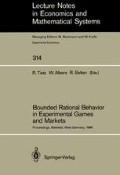Summary
In this paper a new model for one-step characteristic function games is introduced which explicitly models bargaining chains as chains of stepwise dominating bargaining states. This process model includes the description of reciprocal loyalty and revealed aspirations. Reciprocal loyalty can be developed in groups of “similar players”. The effect of reciprocal loyalty is that a player of the group does not break a joint coalition of the group (and thereby does not “betray” players of the group) unless by the defection he increases his outcome for more than a given amount R, which is the same for all players of the group. It should be remarked that reciprocal loyalty does not have the character of an additional utility. It only gets the character of an additional payoff when a player leaves a coalition, and not when he enters it. By means of revealed aspirations a consistency condition for bargaining chains is defined. It is assumed that by every state of the bargaining process the players reveal information about their aspirations they want to see fulfilled if they are in a coalition. Here it is modeled that a player who changes from one state to another, and thereby improves his payoff shows that his aspiration is higher than his outcome in the preceding state.
Access this chapter
Tax calculation will be finalised at checkout
Purchases are for personal use only
Preview
Unable to display preview. Download preview PDF.
References
Albers, W.: Bloc Forming Tendencies as Characteristics of the Bargaining Behavior in Different Versions of Apex Games. In: H. Sauermann (ed.). Beiträge zur experimentellen Wirtschaftsforschung VIII, Coalition Forming Behavior (pp. 172–206). Tübingen: Mohr
Albers, W.: Grundzüge einiger Lösungskonzepte, die auf Forderungsniveaus der Spieler basieren. In: W. Albers, G. Bamberg, R. Selten (eds.). Entscheidungen in kleinen Gruppen (pp. 9–37). Meisenheim/Glan: Hain
Albers, W.:1986. Reciprocal Potentials in Apex Games. In: R.W. Schulz (ed.). Current Issues of West-German Decision Research (pp. 157–171). Frankfurt Bern New York
Albers, W. & Albers, G.: 1984. On the Prominence Structure of the Decimal System. In: R.W. Scholz (ed.). Decision Making under Uncertainty (pp. -271–287). Amsterdam: North-Holland
Albers, W. & Crott, H. & Murnighan, J.K.: 1985. The Formation of Blocs in an Experimental Study of Coalition Formation: Journal of Occupational Behavior, 6, (pp. 38–48)
Aumann, R.J. & Maschler, M.: 1964. The Bargaining Set for Cooperative Games. In: M. Dresher, L.S. Shapley, A.M. Tucker (eds.). Advances in Game Theory (pp. 443–476). Princeton: Princeton University Press
Bennett, E.: 1983. The Aspiration Approach to Predicting Coalition Formation and Payoff Distributing in Sidepayment Games. International Journal of Game Theory, 12 (1), (pp. 1–28)
Crott, H.W. & Albers, W.: 1981. The Equal Division Kernel: An Equity Approach to Coalition Formation and Payoff Distribution in N-Person-Games. European Journal of Social Psychology, Vol. 11, (pp. 285–305)
Komorita, S.S.: 1979. An Equal Excess Model of Coalition Formation. Behavioral Science, 24, (pp. 369–391)
May, T. & Schulz, U.: 1986. Social Values and Structure of Preferences in Experimental Games. In: R. Scholz (ed.). Current Issues in West German Decision Research, Vol. 4 (pp. 255–274). Frankfurt/M. Bern New York Paris
Selten, R.: 1972. Equal Share Analysis of Characteristic Function Experiments. In: H. Sauermann (ed.). Beiträge zur Experimentellen Wirtschaftsforschung, Vol. 3 (pp. 130–165). Tübingen: Mohr
Selten, R.: 1984. Non-cooperative Characteristic Function Bargaining. Lecture held at the 9th Symposium on Operations Research, Osnabrück
Selten, R.: 1985. Equity and Coalition Bargaining in Experimental 3-Person Games. Working Papers of the Sonderforschungsbereich 303, Vol. 154, Bonn: Universität Bonn
Selten, R. & Schuster, K.G.: 1986. Psychological Variables and Coalition Forming Behavior. In: K. Borch & J. Mossin (eds.). Risk and Uncertainty, London: Macmillan
Tietz, R.: 1984. The Prominence Standard, Part I. Discussion Paper A18, Frankfurt/M.: Fachbereich Wirtschaftswissenschaften — Johann-Wolf gang-Goethe-Universität
Turbay, G.: 1977. On Value Theories. Ph.D. Thesis, Houston: Rice University
Author information
Authors and Affiliations
Editor information
Editors and Affiliations
Rights and permissions
Copyright information
© 1988 Springer-Verlag Berlin Heidelberg
About this paper
Cite this paper
Albers, W. (1988). Revealed Aspirations and Reciprocal Loyalty in Apex Games. In: Tietz, R., Albers, W., Selten, R. (eds) Bounded Rational Behavior in Experimental Games and Markets. Lecture Notes in Economics and Mathematical Systems, vol 314. Springer, Berlin, Heidelberg. https://doi.org/10.1007/978-3-642-48356-1_23
Download citation
DOI: https://doi.org/10.1007/978-3-642-48356-1_23
Publisher Name: Springer, Berlin, Heidelberg
Print ISBN: 978-3-540-50036-0
Online ISBN: 978-3-642-48356-1
eBook Packages: Springer Book Archive

